
Lottery is a popular toto hk form of gambling, where participants purchase tickets and try to win cash or goods by matching numbers selected randomly by machines. The prizes are typically paid for by government, private enterprise, or charitable organizations. While the majority of people who play the lottery are simply recreational gamblers, some use it to improve their financial situation and others view it as a way to raise money for philanthropic purposes. Despite the popularity of lotteries, their drawbacks can be severe, especially for those with limited resources.
In the US alone, people spend over $100 billion on tickets every year. That makes it the most popular form of gambling in the country, and a significant contributor to state budgets. But how effective are these lottery games at raising revenue and are they worth the trade-offs that come with them? The answer to that question is complicated.
The lottery is a game of chance and is governed by law. The law defines the game as one in which prizes are allocated by a random procedure that is based wholly on chance. The law also prohibits the sale of tickets to minors and requires that all applicants must be at least 18 years old. The lottery is also prohibited from discriminating on the basis of race, age, gender, or religion.
It is important to understand the legality of the lottery in your state, as different states have their own laws that govern how a lottery operates. Some have restrictions on the types of prizes that can be awarded, while others regulate how many people may participate and when a lottery can be held. Those restrictions are meant to protect against fraud and ensure the integrity of the lottery.
In addition, the state must have a system in place to verify and audit lottery results. Moreover, it must maintain an accurate database of lottery participants and winners, as well as provide public access to this information. Lastly, the state must have appropriate procedures in place to address any disputes that may arise during the lottery process.
Lotteries can be used for a wide variety of purposes, from selling units in subsidized housing to awarding kindergarten placements. They can also be used as a means of taxation. While a lottery can be a great way to raise funds for a charity or for a city project, it should not be used as a substitute for traditional taxation.
Lotteries have a long history in Europe, with some of the first recorded ones dating back to the Renaissance. By the 17th century, it was common for towns in the Low Countries to organize lotteries to help fund town fortifications and to distribute gifts to the poor. The lottery has become a popular and effective way to raise money for a wide range of public projects, but its costs must be carefully considered.